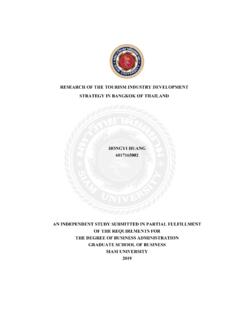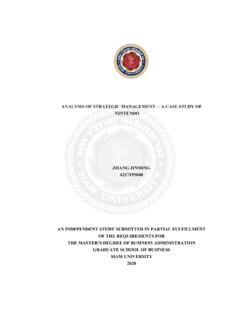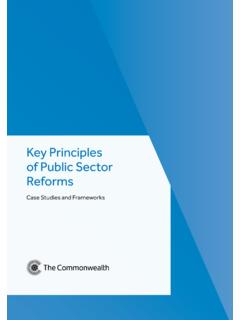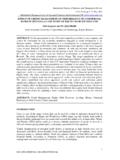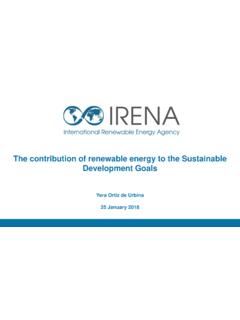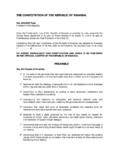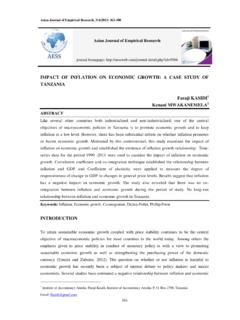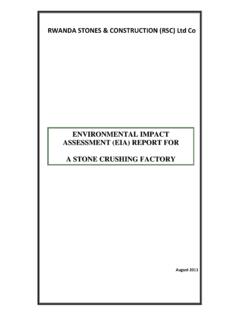Transcription of A CASE STUDY ON THE CAUSES OF ETHNIC CONFLICT …
1 a case STUDY ON THE CAUSES OF ETHNIC CONFLICT WITHIN OGOCHUKWU MICHAEL OSAKWE AN INDEPENDENT STUDY SUBMITTED IN PARTIAL FULFILLMENT OF THE REQUIREMENTS FOR THE DEGREE OF MASTER OF ARTSIN PEACE STUDIES AND DIPLOMACY, SIAM UNIVERSITY, BANGKOK, THAILAND 2017 ABSTRACT ETHNIC CONFLICT in Nigeria has led to the lack of peace and harmony. Nigeria is a complex countryin Africa with over 300 ETHNIC groups and 120 different languages spoken throughout the country. Theissue of discrimination, based on We and Them. negatively affect the socio-economic and politicaldevelopment of Nigeria. Since the day of independence, there has been the struggle for superiority andrecognition among the various ETHNIC groups that led to the Nigerian civil war from 1967-70. Colonization, the struggle for position and power, resource control, social class status and land dispute has been the CAUSES of ETHNIC conflicts within Nigeria.
2 The objectives of this STUDY are to explain theroot CAUSES of ETHNIC conflicts that lead to ethno religious conflicts in Nigeria and to evaluate themagnitude of human and material resources destroyed as a result of such conflicts. A historical researchmethod was employed for gathering secondary data from sources such as books, newspapers, magazines, dictionaries, journals, government publications and online information. The result revealedthat the six geo-political zones of Nigeria namely; North West, North East, North Central, South West,South-South and South East zones have all witnessed all kinds of ETHNIC conflicts resulted from the sameset of CAUSES . Based on the findings, it was recommended that Nigeria should stop the practice offederalism and embrace confederation, which will give the country and its people autonomy to rule and manage their resources.
3 The government should not be biased in sharing the wealth of the nation, oneethnic group, in particular, should not be favored against another. Keywords: Nigeria, Conflicts, ETHNIC Conflicts, Peace I ACKNOWLEDGEMENT I would like to express my deepest appreciation to my advisor, a professor who despite his busy schedule found time for this work. To whom, without your guidance,suggestion and analyses this report would not have been submitted: Assistant Professor Dr. Chaiyanant Panyasiri. To the director of MAPD, who persistently believed in me and overly eager to read what I would come up with in this research. For your encouragements and supports fromthe classrooms and to the end of this piece, thanks you Associate Professor Dr. TatreeNontasak. Furthermore, I would like to thank all the professors in the MAPD program and the staff of Siam University for your supports in various ways.
4 A big thank to my family, my loving mother: Mrs. Isioma Rita Osakwe, mywife: Esther Ujunwa Osakwe, my brother: Mr. Emeka Martins Osakwe, and to my friend: Mr. Nwaizu Obinna Dennis, without them this work would not have been DEDICATION I dedicate this Research STUDY to God Almighty my creator, my strong pillar, my source of inspiration, wisdom, knowledge and understanding. He has been the source of mystrength throughout this program and on His wings only have I soared..Glory be to his Name, Hosanna in the III DECLARATION I, Mr. Ogochukwu Michael Osakwe, hereby declare that this independent STUDY is the record ofauthentic work carried out by me. I may have discussed the paper with others and used adviceand suggestions from others in writing it, but the paper is my own original work and is neither copied from another source without proper acknowledgement, nor written for me by another person, in whole or in part, and has not been submitted to any other university or institution for the award of any degree or diploma.
5 Signature: Name: Ogochukwu Michael Osakwe Date: .. IV ABBREVIATION APC Arewa People s Congress. EBA Egbesu Boys of Africa FCT Federal Capital Territory HDI Human Development Index HDR Human Development Report INC Ijaw National Congress IYC Ijaw Youth Council LGA Local Governments Areas MASSOB Movement for the Actualization of Sovereign state of Biafra NDDC Niger Delta Development Commission NGO Non-Governmental Organization OAUTHC Obafemi Awolowo University Teaching Hospitals Complex ONSOPADEC Ondo State Oil Producing Area Development Commission OPC Oodua People s Congress UCDP Uppsala CONFLICT Data Program UN United Nations USIP United States Institute of Peace WHO
6 World Health Organization V TABLE OF CONTENTS Abstract I Acknowledgement II Dedication III Declaration IV Abbreviations V Table of Contents VI List of Pictures VII CHAPTER 1 Background 1 Significance of the Problem 9 Objective of the STUDY 11 Definition of terms 12 CHAPTER 2 Literature Review 15 Types of ETHNIC Conflicts in Nigeria 18 CAUSES of ETHNIC conflicts in Nigeria 21 Review of Related Research 27 Conceptual Framework 32 CHAPTER 3 Research Methodology 33 Research Design 33 Data Collection 34 Data Analysis Methods 34 CHAPTER 4 ETHNIC Conflicts Between the Northern and the Southern in the North Part of Nigeria 36 ETHNIC Conflicts Between Ilaje and Ijaw Arogbo Over Control of Resource in the Southwest and South-South of Nigeria 38 VI ETHNIC Conflicts Between Ile-Ife and Modakeke Over Social Class in the Southwest of Nigeria 40 Conflicts Between ETHNIC Group and Multinational Companies in the South-South part of Nigeria 41 ETHNIC Conflicts between Aguleri and Umuler Over Land in the South East of Nigeria 42 CAUSES that Lead to the Conflicts 47 Discussion 48 CHAPTER 5 Conclusion 50 Recommendation 51 References 53 VII LIST OF PICTURES Picture No 1: ETHNIC Map of Nigeria 5 Picture No 2.
7 Nigerian Map showing Six Geopolitical Regions, Thirty-Six States and One FCT 8 Picture No 3: A Map shows territorial boundaries of West African countries 17 Picture No 4: Communal conflicts in Nigeria 24 Picture No 5: Nigeria: Muslims slaughter 400-500 Christians in latest Jos crisis 44 Picture No 6: Nine Times ETHNIC and religious crisis threatened the peace of Nigeria 45 Picture No 7: A Bloody Clash in Ile-Ife 46 1 CHAPTER ONE INTRODUCTION Background of the STUDY Nigeria is a country in the continent of Africa, with over 300 ETHNIC groups and 120 different languages spoken in the country. Nigeria has two major religious affiliations Christianity and Islam, which are both the origin and history of ETHNIC CONFLICT in the country. The ETHNIC groups have all seen themselves as a rival competing for power and decision making over economic resources.
8 Today the country faces a more serious challenge to peace and stability as a result of ETHNIC differences; this has led to insecurity, instability, poverty and corrupt political institutions in the country. According to Reuter (2015) International peace and security has been mainly threatened by ETHNIC clashes. The clashes in Balkans, rwanda , Chechnya, Iraq, Indonesia, Sri Lanka, India, and Darfur, as well as in Israel where the West Bank and the Gaza Strip, are the worst examples of the late 20th and 21st centuries. ETHNIC chaos is the widely known result of unstable province, states and most of the case , the whole region. These incidents are associated with ETHNIC clashes, multitude human right violations, genocide and crimes against humanity, all make the economic to fall to the lowest, state failure and refugee crises.
9 Chaos in ETHNIC clashes often led to huge human hardship. 2 Many African countries such as Democratic Republic of Congo, rwanda , Uganda, Somalia, Sudan, Burundi and many more have experienced series of CONFLICT , that occurred between communities, ETHNIC groups and religious groups and Nigeria is not excluded. CONFLICT have been linked to ethnicity and this have led to serious loss of life and property in many areas of the country. The first years of Nigerian independence were characterized by severe conflicts within and between regions (InfoPlease, 2012). Compounding the problem of underdevelopment in a poor country like Nigeria is ethno nationalism, access to resources and allocation of power poses a great threat to peace, security and progress of the nation.
10 Nigeria has a long history of ETHNIC CONFLICT in which development cannot take place. According to StudyMode Website (2013), the problem of Nigeria ethnicity and ETHNIC clashes has its roots from the history of colonialism, which forcefully brought the ETHNIC groups of the northern and southern states to form the entity called Nigeria in the year 1914. In addition to the problem, StudyMode, (2013) stated that the case of Nigeria circumstance with past event of colonialism distress have brought into existence, hatred and clashes within different ETHNIC groups. As the case may be, the country persists and remains polarized along ETHNIC divisions. Lack of trust and discrimination has frequently characterized the features relationship of all the ETHNIC groups in the country, affecting unity, peace and stability of the country.
